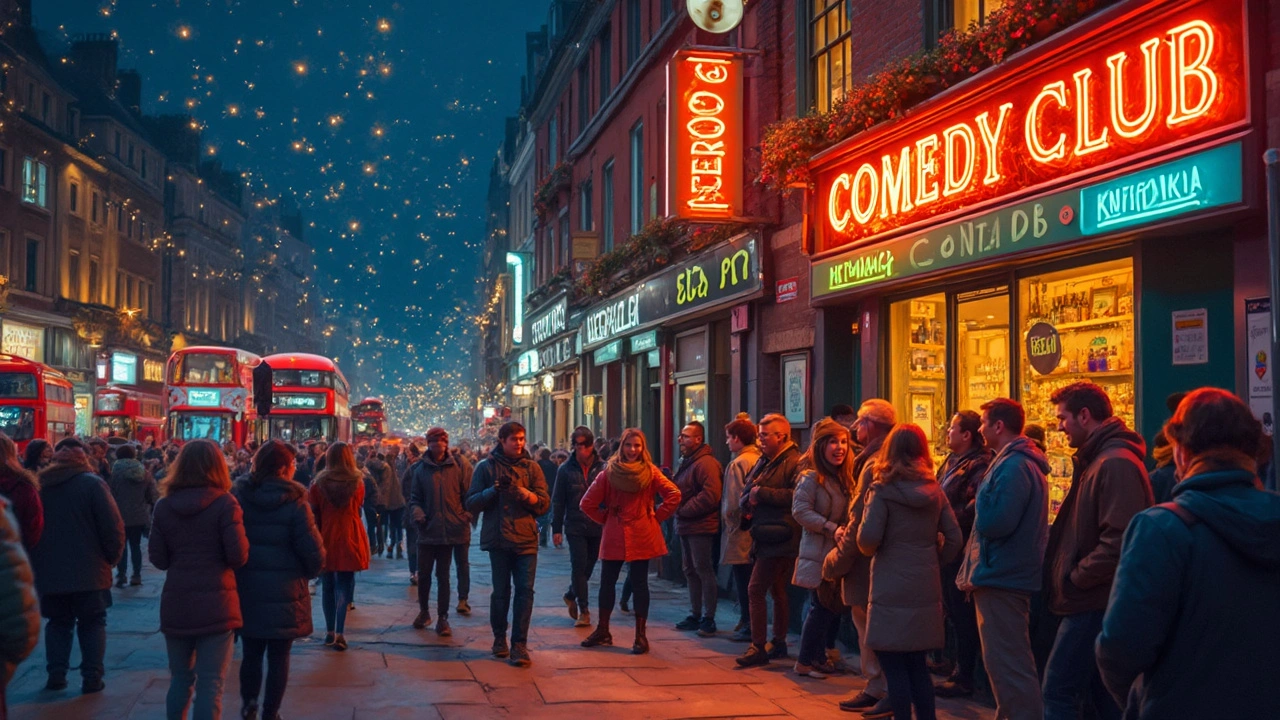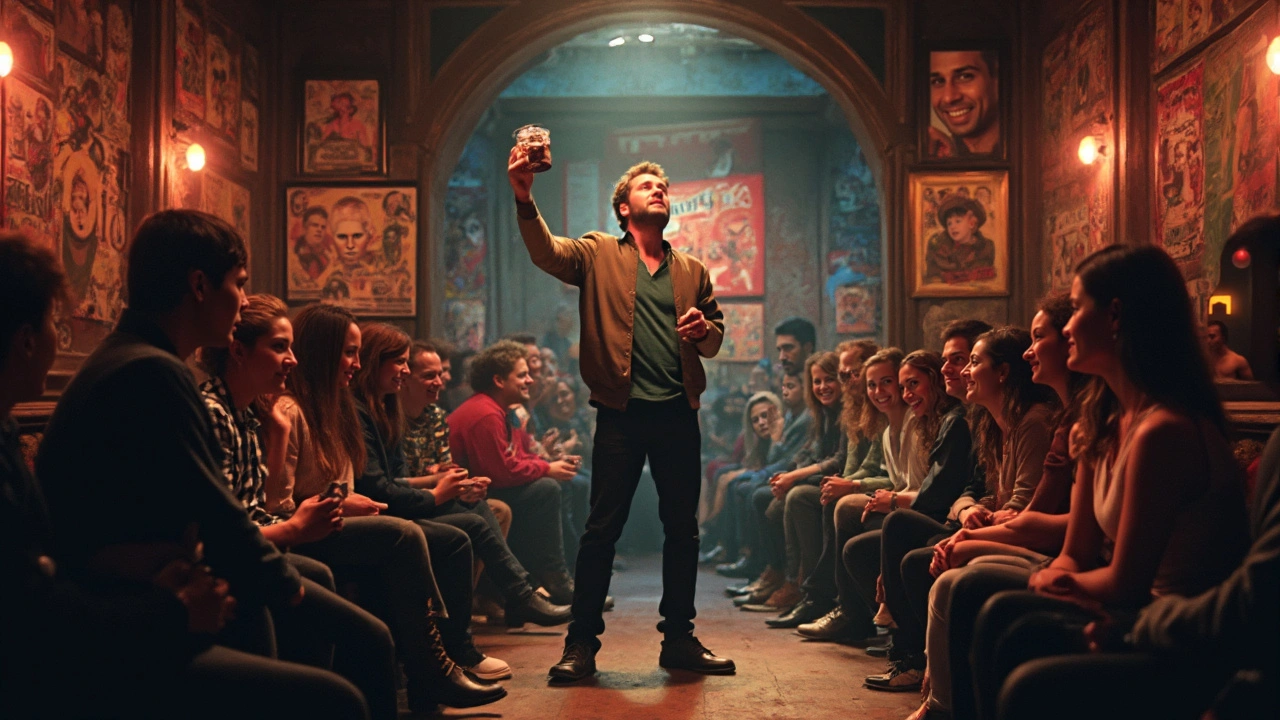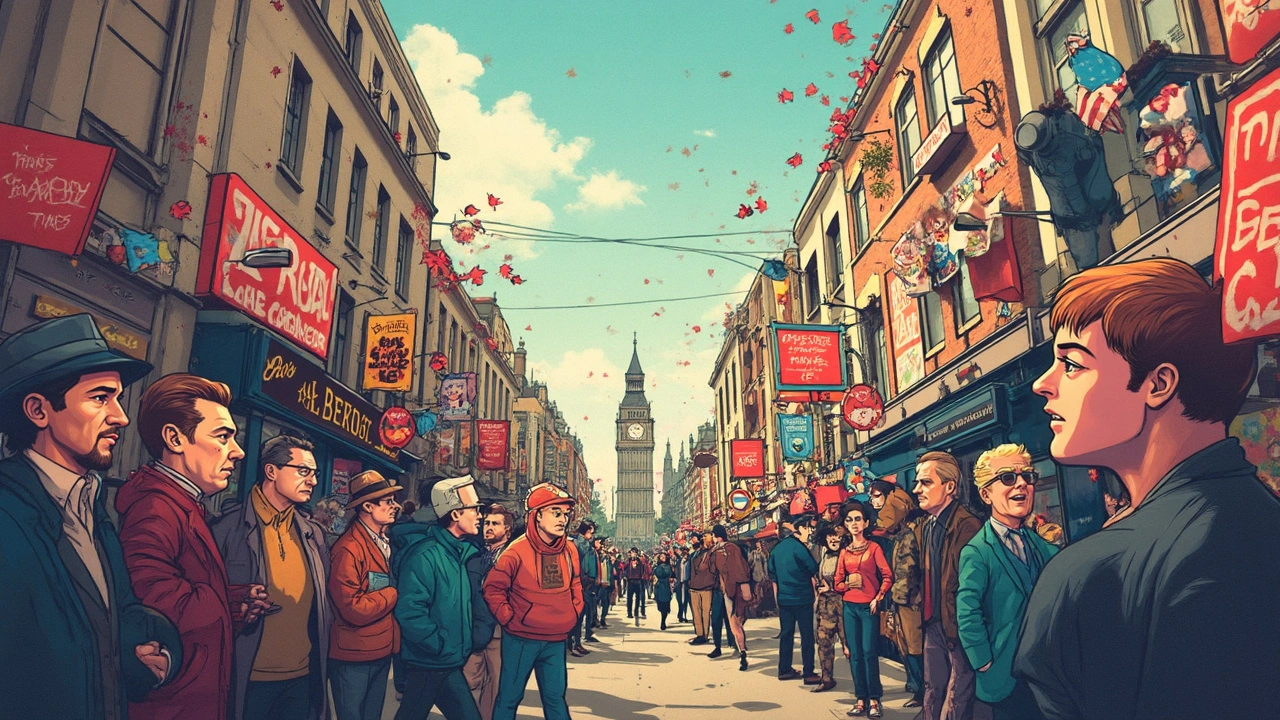How Comedy Shows Shape Life in London: From Stand-Up Nights to Cultural Identity

No one ever left the Soho Theatre after a night of stand-up without feeling the London air buzz just a bit differently. In London, comedy shows aren’t just a pastime—they’ve elbowed their way into shaping the conversation in pubs, on the Tube, and even in boardrooms. Stroll the South Bank on a Friday night or scroll through your mates’ stories on Instagram, and you’ll catch the playful roar spilling out from hidden venues and storied clubs. Comedy in this city is more than a punchline: it’s a mirror, a social glue, and sometimes a gentle nudge to rethink what it means to be part of this wild city.
The Heartbeat of British Humour: Comedy’s Place in London Culture
London isn’t shy about poking fun at itself. The tradition stretches from the clever satire of Georgian pamphleteers to the late-night improv at The Comedy Store and the surreal magic of shows like "Taskmaster." Comedy clubs in London throng with a mix of locals and expats, wide-eyed students and sharp-tongued pensioners. The capital’s sense of humour is dry, layered, sometimes resolutely weird, and you’ll find its echoes in everything from the news headlines to the queue for a bacon sarnie at Borough Market.
Comedy has always acted as both a safety valve and a poking stick. During tough times, like the ‘winter of discontent’ or the height of Brexit debates, what got many Londoners through was the relentless parade of wit. Comics such as James Acaster, London’s Katherine Ryan, and Romesh Ranganathan have become reference points for shared experience. Their sharp observations carve out a space for Londoners to see themselves and their gripes reflected without judgment.
The impact isn’t just abstract. Look at regulars at Angel Comedy Club or Up The Creek; you’ll see nurses, traders, postmen, and students finding common ground. British humour (yes, with a 'u') helps smooth over awkward differences, teases out new perspectives, and sometimes connects worlds that rarely overlap outside club doors. A 2023 survey by the British Comedy Guide found that 68% of Londoners believe comedy acts as a “social glue” in the city, creating bonds faster than you can say "knock-knock."
Comedy Venues: London’s Community Centres with Punchlines
Before the pandemic, it was impossible to walk through Soho, Camden, or Shoreditch without being flyered for a gig. Since then, the city's comedy venues have only grown in importance, acting as pop-up sanctuaries for laughter-starved crowds. The Comedy Store, Hackney Empire, and Leicester Square Theatre aren’t just tourist attractions—they’re local lifelines. If you wander into The Top Secret Comedy Club for their Monday new-acts night, you might catch an unknown trying out a set that’ll go viral by Tuesday.
There’s something uniquely London about the mix of formality and chaos at these clubs. It’s not unusual to spot a celebrity dropping by, blending in with the crowd. One night a comedian like Nish Kumar might roast Westminster, the next, a newer comic offloads about overpriced coffee shops in Highgate. It feels hyper-local—and yet these jokes ripple out far beyond Zone 1.
- London boasts more than 50 regular comedy nights each week, according to Visit London.
- The biggest spike in attendance? That’s every November, during the London Comedy Festival, when venues as intimate as the Bill Murray in Islington to grand spaces like the Palladium are packed.
- Some venues, such as Backyard Comedy Club in Bethnal Green, took lockdown as a chance to stream shows worldwide—flattening geography and letting the world sample what a true London heckle sounds like.
If you’re looking to really plug into the city, nothing beats attending a live gig. Regular punters tip this: grab an off-peak ticket (midweek shows tend to be cheaper and have more experimental acts), and keep an eye out for "secret headliners." And don't be shy about sitting at the front—unless you're wearing a particularly garish jumper, then brace for banter.

From Political Satire to Social Change: Comedy as a Catalyst
Londoners don’t take much at face value, especially when it comes to politics. This cynicism didn’t start with Boris or Brexit—you can trace it back to satirical prints lampooning the monarchy in the 18th century. That spirit lives on in panel shows like "Have I Got News For You" or "Mock the Week," shows filmed and often performed in London venues. Here, politicians and public figures learn they’re fair game.
The speed with which a new scandal gets a comedy treatment is astonishing. Just ask anyone who’s attended "The Bugle Live" podcast taping at King’s Place—some gags are barely a day old. It’s not all about taking the mickey, though. The real power kicks in when comedians use their platforms to highlight inequalities or amplify voices that aren’t usually heard. Acts like London’s own Sophie Duker have explored everything from race and gender to the chaos of the city’s rental market.
Here’s where things get interesting: comedy isn’t a one-way street. Many comedians work with charities, using humour to break the ice at outreach events or even fundraise for causes close to home like Centrepoint or Shelter. Some borough councils have even run workshops with comedians to address social issues, especially around mental health and loneliness.
The edgy climate in London makes it possible for comedians to court controversy and start conversations. Not all jokes land, and sometimes lines get crossed. Recent debates about "cancel culture" hit especially hard in the comedy scene, yet most Londoners seem to embrace the rough and tumble nature of this evolving art.
Comedy shows London: Pushing Boundaries and Building Identity
There’s something uniquely London about finding yourself laughing alongside people you’d never meet otherwise. Comedy’s greatest gift here? It’s the ultimate icebreaker. Whether you’re at a glitzy Soho showcase or a grassroots open mic in Brixton, the shared experience breaks down social barriers at lightning speed. The city’s diversity means a single comedy night might include bits in Malayalam, Yiddish, or straight-up cockney rhyming slang—sometimes in the same act.
Something that sets the London comedy crowd apart? Audiences are up for anything. They’ll ride with you through storytelling, political digs, observational bits about the weather (seriously, every comic has at least two), and absurdist improv. The feedback is instant. Applause? Sure. Silence? Even better—comedians say that’s where the magic (or awkwardness) happens.
If you’re new to London or simply looking to feel more at home, comedy gigs offer a shortcut to the city’s soul. Try sampling different types: queer cabaret nights at The Glory, Black British showcases with Mo Gilligan, or improv battles at Hoopla. There’s even a thriving scene for family-friendly daytime comedy, with shows popping up at Southbank Centre during school holidays—my kids, Silas and Thea, never let me forget which acts got the best “dad jokes.”
- London is home to the UK’s only dedicated LGBTQ+ comedy festival.
- In 2024, British comedy exports generated over £250 million for the London economy, with a surge in ticket sales for international visitors according to the ONS (Office for National Statistics).
- According to the City of London Council, laughter therapy programs piloted in boroughs like Lambeth saw a measurable drop in reported loneliness among participants.
The key for anyone wanting to join the party? Stay open, avoid heckling unless you’re ready for a clever comeback, and remember that in London, the boundary-pushing never really stops.

The Enduring Influence: What’s Next for London’s Comedy Scene?
You’d think, with streaming and social media, that live comedy would struggle—yet London’s scene is bursting at the seams. The city keeps churning out new comedy nights, podcasts, streaming specials, and even virtual gigs. Brands like Have A Word and Soho Theatre On Demand are leading the charge digitally. But mostly, Londoners keep packing out basements and theatres, eager for the magic that only comes when comics and audience spark off one another in real time.
Stand-up is also evolving—open mics are blending with music and drag, and shows with such formats as "roast battles" and "audience confessionals" have taken off at spots like Angel Comedy. There’s a steady stream of new talent: the Chortle Student Comedy Award draws hopefuls from all London’s universities every spring, and many household names started out passing flyers in Piccadilly Circus before selling out the Apollo.
For those who prefer data to banter, here’s what the numbers say:
| Year | # Weekly Comedy Shows | Avg. Ticket Price | Annual Audience (in London) |
|---|---|---|---|
| 2019 | 35 | £12 | 1.6 million |
| 2023 | 54 | £15 | 2.3 million |
| 2024 | 59 | £17 | 2.5 million |
When you live in London, you feel that just about anything can happen on a comedy night. Maybe you’ll catch a rising star before the TV agents do. Maybe you’ll find yourself the butt of a joke—just roll with it, it usually means you’re fitting right in. And even after the lights come up, the feeling lingers: comedy here isn’t a distraction, it’s a part of being a Londoner. Every laugh echoes the city’s history, diversity, and that careful blend of cheek and charm you only get beside the Thames.
